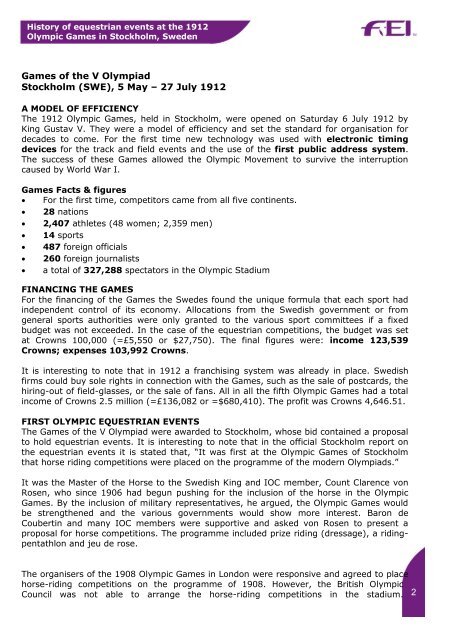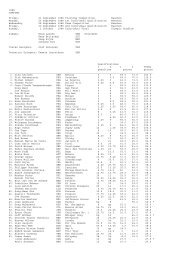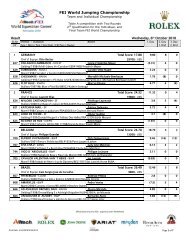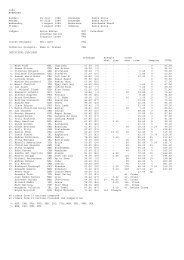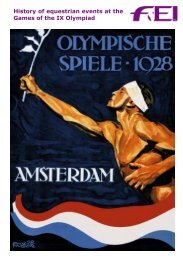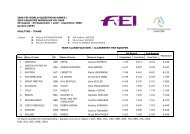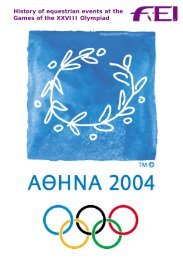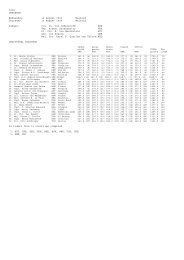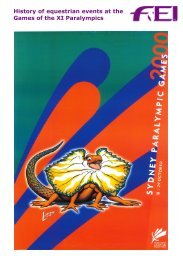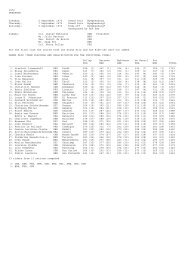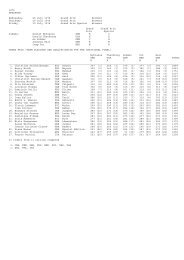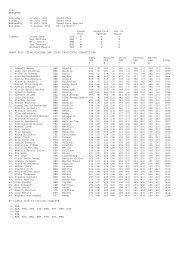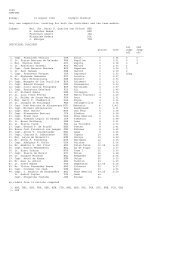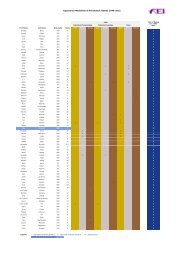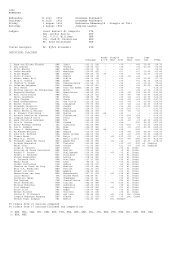History of equestrian events at the Games of the V ... - FEI History Hub
History of equestrian events at the Games of the V ... - FEI History Hub
History of equestrian events at the Games of the V ... - FEI History Hub
Create successful ePaper yourself
Turn your PDF publications into a flip-book with our unique Google optimized e-Paper software.
<strong>History</strong> <strong>of</strong> <strong>equestrian</strong> <strong>events</strong> <strong>at</strong> <strong>the</strong> 1912<br />
Olympic <strong>Games</strong> in Stockholm, Sweden<br />
<strong>Games</strong> <strong>of</strong> <strong>the</strong> V Olympiad<br />
Stockholm (SWE), 5 May – 27 July 1912<br />
A MODEL OF EFFICIENCY<br />
The 1912 Olympic <strong>Games</strong>, held in Stockholm, were opened on S<strong>at</strong>urday 6 July 1912 by<br />
King Gustav V. They were a model <strong>of</strong> efficiency and set <strong>the</strong> standard for organis<strong>at</strong>ion for<br />
decades to come. For <strong>the</strong> first time new technology was used with electronic timing<br />
devices for <strong>the</strong> track and field <strong>events</strong> and <strong>the</strong> use <strong>of</strong> <strong>the</strong> first public address system.<br />
The success <strong>of</strong> <strong>the</strong>se <strong>Games</strong> allowed <strong>the</strong> Olympic Movement to survive <strong>the</strong> interruption<br />
caused by World War I.<br />
<strong>Games</strong> Facts & figures<br />
For <strong>the</strong> first time, competitors came from all five continents.<br />
28 n<strong>at</strong>ions<br />
2,407 <strong>at</strong>hletes (48 women; 2,359 men)<br />
14 sports<br />
487 foreign <strong>of</strong>ficials<br />
260 foreign journalists<br />
a total <strong>of</strong> 327,288 spect<strong>at</strong>ors in <strong>the</strong> Olympic Stadium<br />
FINANCING THE GAMES<br />
For <strong>the</strong> financing <strong>of</strong> <strong>the</strong> <strong>Games</strong> <strong>the</strong> Swedes found <strong>the</strong> unique formula th<strong>at</strong> each sport had<br />
independent control <strong>of</strong> its economy. Alloc<strong>at</strong>ions from <strong>the</strong> Swedish government or from<br />
general sports authorities were only granted to <strong>the</strong> various sport committees if a fixed<br />
budget was not exceeded. In <strong>the</strong> case <strong>of</strong> <strong>the</strong> <strong>equestrian</strong> competitions, <strong>the</strong> budget was set<br />
<strong>at</strong> Crowns 100,000 (=£5,550 or $27,750). The final figures were: income 123,539<br />
Crowns; expenses 103,992 Crowns.<br />
It is interesting to note th<strong>at</strong> in 1912 a franchising system was already in place. Swedish<br />
firms could buy sole rights in connection with <strong>the</strong> <strong>Games</strong>, such as <strong>the</strong> sale <strong>of</strong> postcards, <strong>the</strong><br />
hiring-out <strong>of</strong> field-glasses, or <strong>the</strong> sale <strong>of</strong> fans. All in all <strong>the</strong> fifth Olympic <strong>Games</strong> had a total<br />
income <strong>of</strong> Crowns 2.5 million (=£136,082 or =$680,410). The pr<strong>of</strong>it was Crowns 4,646.51.<br />
FIRST OLYMPIC EQUESTRIAN EVENTS<br />
The <strong>Games</strong> <strong>of</strong> <strong>the</strong> V Olympiad were awarded to Stockholm, whose bid contained a proposal<br />
to hold <strong>equestrian</strong> <strong>events</strong>. It is interesting to note th<strong>at</strong> in <strong>the</strong> <strong>of</strong>ficial Stockholm report on<br />
<strong>the</strong> <strong>equestrian</strong> <strong>events</strong> it is st<strong>at</strong>ed th<strong>at</strong>, “It was first <strong>at</strong> <strong>the</strong> Olympic <strong>Games</strong> <strong>of</strong> Stockholm<br />
th<strong>at</strong> horse riding competitions were placed on <strong>the</strong> programme <strong>of</strong> <strong>the</strong> modern Olympiads.”<br />
It was <strong>the</strong> Master <strong>of</strong> <strong>the</strong> Horse to <strong>the</strong> Swedish King and IOC member, Count Clarence von<br />
Rosen, who since 1906 had begun pushing for <strong>the</strong> inclusion <strong>of</strong> <strong>the</strong> horse in <strong>the</strong> Olympic<br />
<strong>Games</strong>. By <strong>the</strong> inclusion <strong>of</strong> military represent<strong>at</strong>ives, he argued, <strong>the</strong> Olympic <strong>Games</strong> would<br />
be streng<strong>the</strong>ned and <strong>the</strong> various governments would show more interest. Baron de<br />
Coubertin and many IOC members were supportive and asked von Rosen to present a<br />
proposal for horse competitions. The programme included prize riding (dressage), a ridingpent<strong>at</strong>hlon<br />
and jeu de rose.<br />
The organisers <strong>of</strong> <strong>the</strong> 1908 Olympic <strong>Games</strong> in London were responsive and agreed to place<br />
horse-riding competitions on <strong>the</strong> programme <strong>of</strong> 1908. However, <strong>the</strong> British Olympic<br />
Council was not able to arrange <strong>the</strong> horse-riding competitions in <strong>the</strong> stadium.<br />
2


